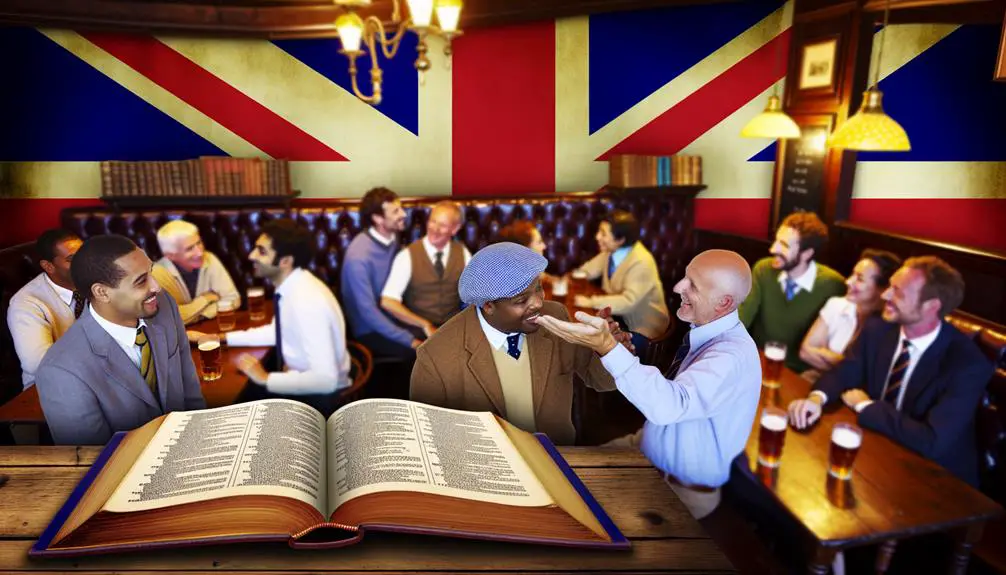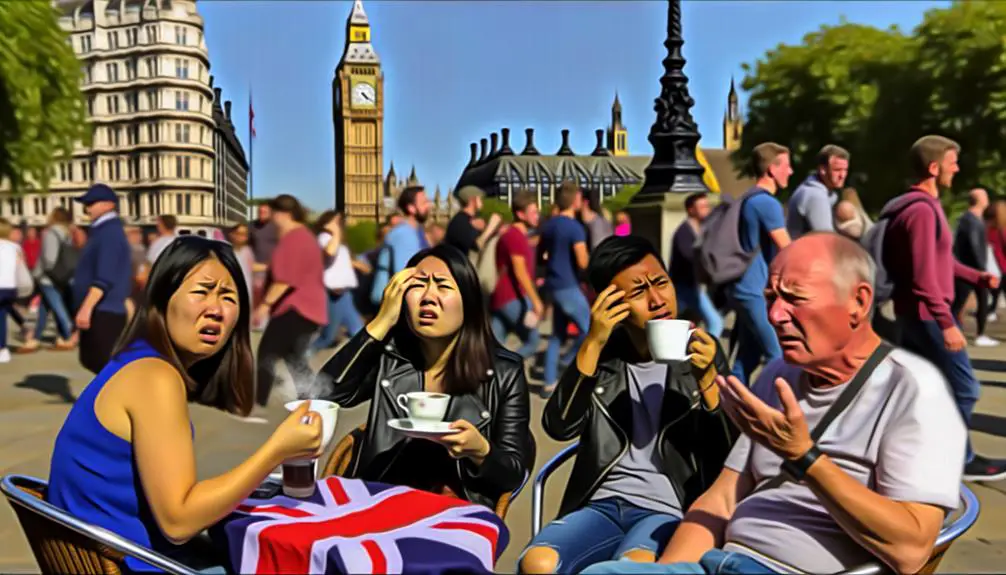In British slang, 'wanker' originally denotes someone who masturbates. However, you'll often hear it used figuratively to criticize someone as self-obsessed or ineffectual. Its application varies widely in British society, serving as an expression of disdain, jest, or even camaraderie, depending on the context and relationship between the people involved. Appropriate use also differs across regions and situations, exposing the word's rich tapestry of meanings and societal attitudes. This term's journey from a simple, vulgar insult to a nuanced descriptor of behavior or character highlights the dynamic nature of language. Exploring further exposes its regional variations and cultural impact.
Origins of the Term

The term 'wanker' finds its roots in British slang, originally emerging as a derogatory descriptor with a literal meaning tied to masturbation. Over time, you'll find that this term has sparked considerable etymology debate among linguists and historians, each delving deep into its origins and evolution within the English language. This discourse is central to understanding the depth of linguistic controversies surrounding 'wanker'.
As you explore further, it becomes evident that the term's journey from a straightforward, albeit vulgar, reference to a more nuanced and multifaceted piece of slang is steeped in cultural shifts and linguistic innovations. The debate often hinges on when and how 'wanker' transcended its literal origins to become a staple of British vernacular, used to convey disdain or contempt, albeit in a manner that's not always tied to its original meaning.
This evolution underscores the dynamic nature of language, where words morph and adapt, influenced by changing societal attitudes and contexts. As part of this linguistic journey, 'wanker' has become a focal point in discussions about how language reflects cultural and social norms, highlighting the complexities and inherent controversies in tracing the lineage of a single word within the rich tapestry of English slang.
Literal and Figurative Meanings
Delving into the term 'wanker,' you'll uncover both its literal and figurative meanings, which have evolved substantially from its origins in British slang. Literally, the word refers to someone who engages in masturbation, a definition rooted deeply in its etymological origins. This basic, somewhat vulgar meaning, however, merely scratches the surface of how the term is employed in conversation and written communication.
Figuratively, 'wanker' has morphed into a broad pejorative, aimed at someone considered to be self-obsessed, contemptible, or generally useless. This expansion in meaning reflects a common trajectory in slang, where words take on broader, often more abstract connotations over time. In the context of international comparisons, an observation can be made about how similar expressions exist in other languages, yet the cultural nuances and frequency of use can vary widely. For instance, while the literal meaning is universally understood, the figurative, insulting usage is particularly British, highlighting the unique way language and culture intertwine.
Understanding the etymological roots helps to appreciate why 'wanker' carries such weight in British English, serving as a bridge between its literal origins and its figurative, contemporary use.
Usage in British Culture

Understanding the etymological roots of 'wanker' sets the stage for exploring its role and implications within British culture. You'll find that this term, steeped in various shades of meaning, weaves itself into the fabric of British society in unique ways. It's a word that's as flexible as it's potent, capable of expressing disdain, jest, or camaraderie, depending on the context in which it's used.
When considering how 'wanker' is deployed, you must weigh etiquette considerations heavily. In casual settings among friends, its usage might provoke laughter or serve as a light-hearted jab. However, in more formal or professional environments, throwing this term around could be seen as highly inappropriate, reflecting poorly on your understanding of social nuances.
International perceptions of the term add another layer of complexity. Visitors or those unfamiliar with the depth of British slang might misinterpret the intensity or intention behind the word, leading to confusion or offense. Therefore, understanding its place and appropriate usage within British culture isn't just about knowing when and where to say it; it's about grasping the subtleties of communication that define social interactions in the UK.
Regional Variations
You'll find that the term 'wanker' carries different connotations depending on whether you're in the North or South of Britain. This distinction extends to urban and rural areas, where interpretations and usage can greatly vary.
Over time, these regional variations have contributed to the evolution of the slang, reflecting changes in societal attitudes and language dynamics.
North Vs. South Usage
While the term 'wanker' is universally recognized across the UK, its usage and connotations can vary markedly between the North and the South. Dialect influences and pronunciation differences play a significant role in how the word is perceived and employed in various regions.
- In the North, the term might be infused with a heavier, more pronounced accent, giving it a distinct edge.
- Pronunciation differences in the South often soften the term, potentially altering its impact.
- Cultural nuances in each region dictate the term's offensiveness or playfulness.
- Frequency of use varies, with some areas employing it more liberally as part of the local vernacular.
Understanding these regional variations offers a richer insight into the dynamic nature of British slang.
Urban Vs. Rural Interpretations
Exploring the urban versus rural interpretations of the term 'wanker' reveals notable differences in its usage and perceived offensiveness across the UK's diverse landscapes. In urban areas, you might find the term used more liberally, often stripped of its harsher connotations among younger generations. This casualness is partly due to the dense, multicultural settings where slang mixes freely, diluting the impact of specific words.
Conversely, in rural settings, 'wanker' retains a stronger sting, with age influence playing a significant role. Older generations in these areas are more likely to perceive the term as highly offensive. The generational perspectives in rural regions contribute to a more conservative stance on language, where words carry weightier implications. This distinction underscores how location and age shape the interpretation of slang.
Slang Evolution Over Time
The evolution of slang, including terms like 'wanker', showcases distinct regional variations that reflect the dynamic nature of language over time. These variations aren't static; they evolve, influenced heavily by global trends and the digital world.
- Global Influences: As cultures intermingle, slang terms adopt new meanings or gain popularity in regions far from their origins.
- Digital Adaptation: Social media and online communities accelerate the spread and evolution of slang, making regional differences more fluid.
- Emotional Connection: People often form a deep, emotional bond with regional slang, viewing it as a marker of identity.
- Preservation Efforts: While some fear globalization might dilute regional slang, concerted efforts to preserve local dialects and slang continue, ensuring their survival and ongoing evolution.
In Media and Entertainment
In media and entertainment, the term 'wanker' has carved its niche, especially within iconic TV references and music lyrics. This usage reflects not only the word's versatility but also its ability to add a layer of authenticity or humor, depending on the context.
Analyzing these instances provides insight into how British slang evolves and permeates popular culture.
Iconic TV References
You'll find the term 'wanker' peppered throughout British television shows, serving not only as a common insult but also as a cultural touchstone that reveals nuances about character relationships and societal norms. This word's integration into dialogues markedly impacts character portrayals, utilizing comedic timing to either establish dominance or showcase vulnerability.
- It underscores power dynamics, often highlighting the underdog or the outsider in a narrative.
- Enhances comedic elements, using the word at the peak of tension for relief.
- Develops characters, portraying depth through reactions to the term.
- Reflects societal attitudes, showcasing how acceptance of the term varies across different settings and eras, from outright scandalous to a playful jab among friends.
Music and Lyrics Usage
Exploring how the term 'wanker' permeates music and lyrics offers insight into its cultural resonance within the world of media and entertainment. This term, deeply rooted in British slang, has found its way into various genres, showcasing its versatility and the influence it holds over artists and audiences alike. From punk to indie, its usage often reflects not just a casual, colloquial tone but also a deliberate choice that aligns with the genre's ethos or the artist's persona.
Additionally, its incorporation can lead to controversies, sparking debates about language and its place in music. These instances highlight how 'wanker' transcends mere vocabulary, becoming a tool for expression that artists wield with intent, treading the fine line between authenticity and offense.
Social Implications

Understanding the social implications of the term 'wanker' in British slang reveals its substantial impact on interpersonal dynamics and cultural perceptions. The word's usage navigates a fine line between humor and insult, deeply rooted in the context in which it's uttered. Its offensive potential varies greatly, shaping international perceptions of British communication styles as either endearingly blunt or unnecessarily harsh.
Consider these points to understand the emotional landscape the term evokes:
- Connection and Alienation: While it can foster a sense of camaraderie among friends, it can equally alienate those unfamiliar with its nuanced use.
- Cultural Misunderstandings: For non-Brits, misunderstanding its use can lead to unexpected confrontations or judgments about British decorum.
- Self-Expression and Identity: Its use can be a powerful tool for self-expression, reflecting one's place within or against societal norms.
- Evolving Language: The term's meaning and impact have evolved, reflecting broader changes in societal attitudes towards language and offensiveness.
Frequently Asked Questions
How Has the Term "Wanker" Influenced the Perception of British Humor on an International Scale?
You've seen how British comedy exports, enriched by linguistic evolution, shape global perceptions. The term in question highlights the unique blend of humor, affecting how international audiences understand and appreciate the nuances of British wit.
Are There Any Notable Legal Cases or Political Incidents in Which the Term "Wanker" Played a Significant Role?
You've likely not come across any significant legal cases or political incidents where the term played a pivotal role, highlighting its minimal legal implications and low impact on political correctness conversations.
How Do Non-English Speaking Cultures Perceive or Translate the Term "Wanker" in Their Languages and Cultural Contexts?
You'll find that non-English speaking cultures face translation challenges and cultural adaptations when interpreting this term. Each culture's unique perspective influences its understanding, often leading to varied, nuanced interpretations across different linguistic and cultural landscapes.
Have There Been Any Significant Shifts in the Demographic Usage of "Wanker" Over the Years, Particularly Among Different Age Groups or Social Classes?
You've seen language evolution firsthand. The term's usage among age groups and social classes shows generational attitudes shifting. It's not just for the elite or youth anymore; it's a universal linguistic adaptation.
How Does the Use of the Term "Wanker" in Digital Communication, Such as Social Media and Online Forums, Differ From Its Traditional Verbal Usage?
In digital communication, you'll find its use varies with emoji interpretation and faces moderation challenges. Unlike verbal usage, online platforms offer anonymity, affecting how freely it's used across social media and forums.
Conclusion
To wrap up, you've delved into the depths of 'wanker,' a term with roots as tangled as London's own streets.
It's a word that's wandered through British culture, from whispered insults in dimly lit pubs to its bold appearances on the silver screen.
Like a chameleon, it changes shades, from literal to figurative, echoing the diversity of the regions it inhabits.
Remember, as with any powerful slang, it's not just the word, but how and where you wield it, that paints its true color.







